Highlights
Post Date:2023.03.24
The paper reports the identification of four effectors, named EPC1 to EPC4, that are involved in host specificity of cucumber anthracnose fungus Colletotrichum orbiculare.
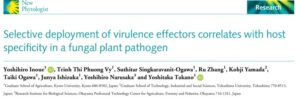
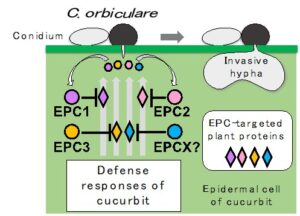
We have published the paper:
Inoue Y, Phuong Vy TT, Singkaravanit-Ogawa S, Zhang R, Yamada K, Ogawa T, Ishizuka J, Narusaka Y, Takano Y. Selective deployment of virulence effectors correlates with host specificity in a fungal plant pathogen. (2023) New Phytologist, 238:1578-1592
It is estimated that effectors of fungal pathogens have play important roles for their host specificity but the details are unknown. The paper reports the identification of four effectors, named EPC1 to EPC4, that are involved in host specificity of cucumber anthracnose fungus Colletotrichum orbiculare.
Post Date:2022.05.20
The paper reveals the recognition mechanisms of pathogen-derived sphingolipids in Arabidopsis thaliana, deepening our understanding of PAMP-triggered immunity in plants.
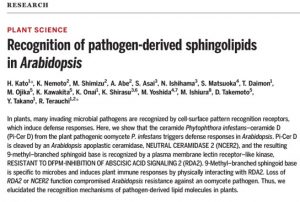
We have published the paper:
Kato H, Nemoto K, Shimizu M, Abe A, Asai S, Ishihama N, Matsuoka S, Daimon T, Ojika M, Kawakita K, Onai K, Shirasu K, Yoshida M, Ishiura M, Takemoto D, Takano Y, Terauchi R. Recognition of pathogen-derived sphingolipids in Arabidopsis. (2022) Science, 376:857-860.
The paper reveals the recognition mechanisms of pathogen-derived sphingolipids in Arabidopsis thaliana, deepening our understanding of PAMP-triggered immunity in plants.
Post Date:2021.05.20
The paper reveals that atypical small chloroplasts present in plant epidermal cells act as defense-related motile organelles, deepening our understanding of the functions of epidermal chloroplasts.
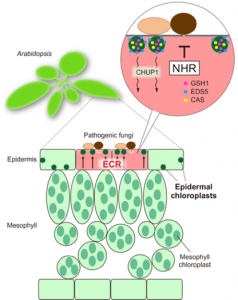
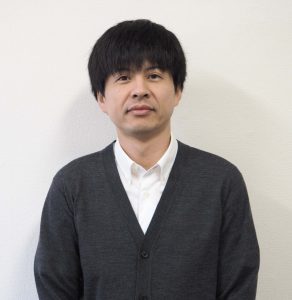
We have published the paper:
Irieda H, Takano Y. Epidermal chloroplasts are defense-related motile organelles equipped with plant immune components. (2021) Nature Communications, 12:2739
The paper reveals that atypical small chloroplasts present in plant epidermal cells act as defense-related motile organelles, deepening our understanding of the functions of epidermal chloroplasts.
Post Date:2019.02.20
The articles on the NIS1 study appeared in a newspaper in Japan
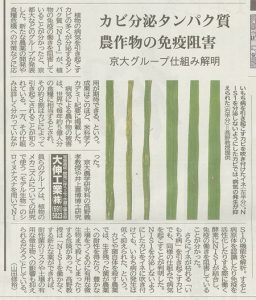
The articles on the NIS1 study appeared in a newspaper in Japan
Post Date:2019.02.20
The paper focusing on the conserved fungal effector NIS1 has been published in Proc. Natl. Acad. Sci. U.S.A.
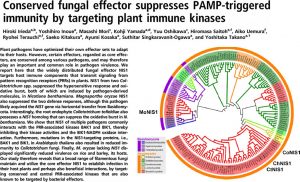
The paper focusing on the conserved fungal effector NIS1 has been published in Proc. Natl. Acad. Sci. U.S.A. The first author is Dr. Hiroki Irieda who is a former postdoctoral researcher in our lab and now an assistant professor at Shinshu Univ. in Japan. The second author is Dr. Yoshihiro Inoue who is a postdoctoral researcher in our lab.


